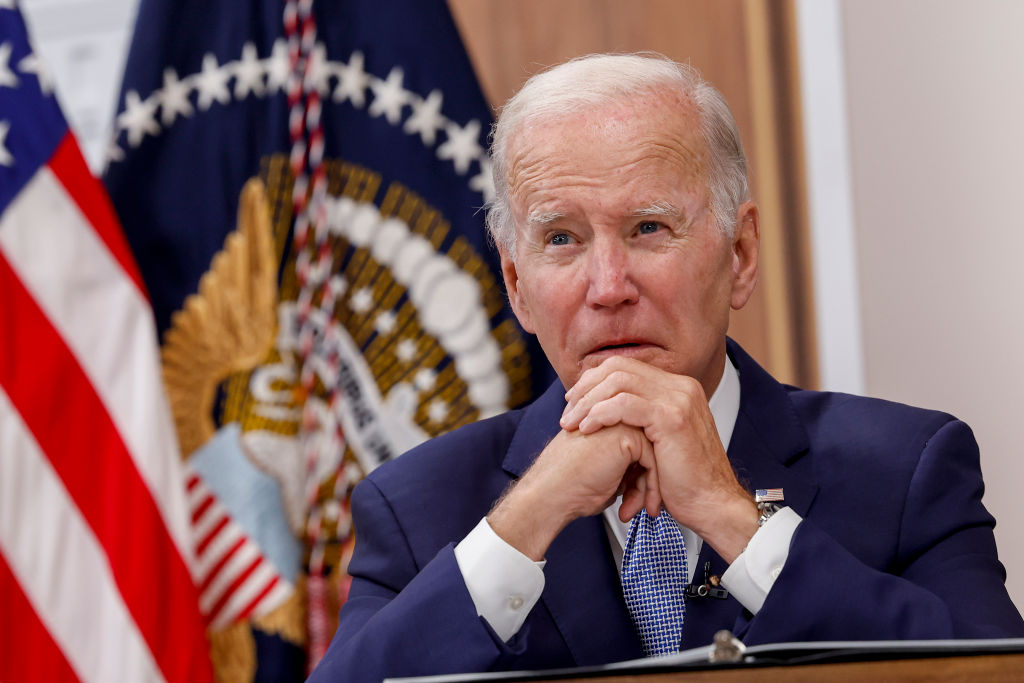The Biden administration is weighing continuing a pause of student loan payments, which would eat up any new revenue from the Democrats’ so-called Inflation Reduction Act.
That revenue was supposed to be the part of the legislation that made it disinflationary.
The current moratorium on repaying student loans — originally implemented in 2020 because of the economic disruption caused by the COVID-19 pandemic — is scheduled to expire at the end of this month.
Education Secretary Miguel Cardona said on NBC’s “Meet the Press” on Sunday an announcement was forthcoming on whether the pause in payments will be extended, despite a tight labor market, with the unemployment rate at 3.5 percent.
“We know Aug. 31 is a date that many people are waiting to hear something from,” the secretary said. “We’ve been talking daily about this, and I can tell you the American people will hear within the next week or so.”
[firefly_embed]
[/firefly_embed]
The Biden administration already has cost American taxpayers hundreds of billions of dollars through the actions it has taken regarding student loans.
On Aug. 16, the Committee for a Responsible Federal Budget reported, “Simply extending the current repayment pause through the end of the year would cost $20 billion — equivalent to the total deficit reduction from the first six years of the [Inflation Reduction Act], by our rough estimates.”
The CRFB explained on July 28, “Through a combination of executive and legislative action, most borrowers have not been required to make payments on their student debt for the past 28 months, and no interest has accrued over that time.”
“Between the repayment pause through August 2022, targeted debt cancellation, and changes to income-driven repayment rules, increases in student debt relief have cost the federal government nearly $300 billion over the past two-and-a-half years,” the nonpartisan organization said. “Most of those costs are from executive actions under the Biden Administration.
“We estimate that extending the student loan payment pause through the end of the year would cost $20 billion and extending through August 2023 would cost $60 billion. This would bring the total cost of the student loan pause alone to nearly $200 billion and total debt relief to close to $350 billion.”
?ANALYSIS? – If the @POTUS cancels student debt, it will wipe out virtually ALL of the fiscal and inflationary gains from the Inflation Reduction Act. https://t.co/gNGQsq5vqd pic.twitter.com/A5ZZvIUhVU
— Marc Goldwein (@MarcGoldwein) August 16, 2022
The main inflation-reducing component touted by Democrats in the Inflation Reduction Act was shrinking the annual federal deficit.
The Penn Wharton Business Model calculated the law would lower the deficit by $248 billion over 10 years, unless the enhanced Affordable Care Act subsidies are extended over the entire decade.
The IRA funds the enhancements for only three years, which is a budget gimmick. It’s likely that, if given the opportunity, Democrats would keep the enhancements in place.
If they are extended the full 10 years, Penn Wharton calculated the IRA’s deficit reduction would be only $89 billion, or $8.9 billion a year.
The Congressional Budget Office estimated the deficit reduction would be $100 billion over the next decade, or $10 billion per year.
Both Penn Wharton and the CBO concluded the Inflation Reduction Act will have a negligible impact on inflation.
But forgiving all or part of the estimated $1.7 trillion in student loans in the country, spread across 45 million Americans, would have a major impact — and it wouldn’t be reduction.
Former Clinton Treasury Secretary Larry Summers warned in a series of tweets on Monday that extending the student loan moratorium or portions of the debt altogether would be inflationary.
“The worst idea would be a continuation of the current moratorium that benefits among others highly paid surgeons, lawyers and investment bankers,” he wrote.
“Student loan debt relief is spending that raises demand and increases inflation. It consumes resources that could be better used helping those who did not, for whatever reason, have the chance to attend college. It will also tend to be inflationary by raising tuitions,” Summers said.
The worst idea would be a continuation of the current moratorium that benefits among others highly paid surgeons, lawyers and investment bankers.
— Lawrence H. Summers (@LHSummers) August 22, 2022
In a February 2021 Washington Post opinion piece, Summers wrote that passing the $1.9 trillion American Rescue Plan, given the economy was already well into a recovery, “will set off inflationary pressures of a kind we have not seen in a generation, with consequences for the value of the dollar and financial stability.”
After it passed the following month, he called it “the least responsible macroeconomic policy we’ve had in the last 40 years.”
Summers was, of course, prescient as inflation hit a four-decade high in June of 9.1 percent and has remained high since.
Democrats just can’t help themselves.
Every dollar they raise in new revenue will be spent and then some, and it’s looking like student loans are next on the Democrats’ docket to try and buy votes.
This article appeared originally on The Western Journal.

























 Continue with Google
Continue with Google